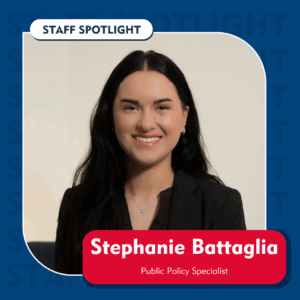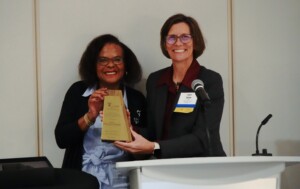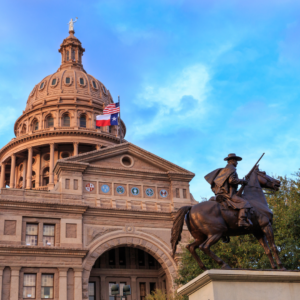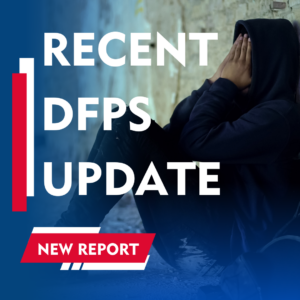Leadership In Public Policy
Texas CASA is a leader in working to assure sound public policies in Texas on issues affecting the child welfare system, the well-being of children and youth in state custody and other policy areas related to our mission.
Along with the local CASA programs and their volunteers, Texas CASA engages in a variety of efforts to study, develop and change public policies. Additionally, Texas CASA staff members conduct research, collaborate with other advocacy and stakeholder groups, lead special task forces and engage in other processes to develop and impact policy.
89TH LEGISLATIVE SESSION
The final day of the 89th Regular Legislative Session in Texas was Monday, June 2. Texas CASA tracked over 366 bills, testified before committees 20 times and registered in support of 122 bills. Texas CASA is very thankful for our local Legislative Advocacy Teams (LATs) for their hard work and advocacy with their local legislative offices. This session, the LATs responded to 240 Action Alerts from Texas CASA. These efforts reflect our continued commitment to both responding to urgent needs and proactively building a more just and responsive child welfare system.
CASA Day at the Capitol took place on March 27, 2025. Texas CASA hosted 54 local CASA programs with over 280 volunteers, staff and board members. The CASA network came together to spread the word about CASA and advocate for the children and families that our 74 local programs serve. Local CASA volunteers, staff and board members participated in over 158 meetings with legislative offices on CASA Day at the Capitol!
LATEST PUBLIC POLICY UPDATES
LEGISLATIVE ADVOCACY TEAMS (LATS)
Legislative Advocacy Teams (LATs) work with Texas CASA and their local CASA programs to build relationships with legislators, develop policy agendas to improve the child welfare system in partnership with Texas CASA, and motivate and empower others in their program to advocate for those improvements. LATs are led by volunteer advocates and/or board members, and work with staff liaisons in each CASA program.
As a part of a LAT, CASA volunteers are able to advocate for children on a larger scale and work toward solutions to systemic problems they encounter in their role. This gives them the chance to be a voice of change not only for the children they serve, but for every child in the child protection system!

Legislative
Advocacy
Teams

Office visits during
CASA Day at the
Capitol 2025

Bills tracked
during the 89th
Legislative Session
LEGISLATIVE SESSION PRIORITIES & OUTCOMES
89TH LEGISLATIVE SESSION OUTCOMES
TEXAS CASA’S PRIORITIES FOR THE 89TH LEGISLATIVE SESSION
1. Texas CASA supports funding for local CASA programs.
- Request an increase in biennial legislative funding under the Health and Human Services Commission by $1.5M to cover the cost of Texas CASA assuming responsibility for the Fingerprint-Based Background Check for CASA volunteers and staff in Texas, as required by HB 4123 enacted during the 88th Legislative Session. Learn more.
- Request an additional $62 million in general revenue to the Office of the Governor Trusteed Programs to ensure level funding for the Victims of Crime Act (VOCA) recipients, who provide lifesaving services for child and adult victims of crime. Learn more.
- Maintain the current appropriation of $643,600 for Family Finding/Collaborative Family Engagement in the Department of Family and Protective Services bill pattern. Learn more.
2. Texas CASA supports policies that preserve families, promote family reunification when possible, and minimize the time children spend in foster care. Learn more.
- Funding additional family preservation services, including evidence-based programs for parenting skills, in-home wrap-around services, behavioral health and substance use treatment
- Increased funding for and increased utilization of post-adoption supports to provide stability and prevent foster care reentry
- Policies and funding efforts to increase mental health services in communities for both children and families, with a particular focus on increasing services in rural areas of Texas
- Monitoring the impact of the statewide scaling of the Alternative Response pilot in Region 10
3. Texas CASA supports funding and policies that provide a child access to safe, stable placements in their community that meet their individual need and support their permanency goals. Learn more.
- Policies and funding to support the successful implementation of the Texas Child-Centered Care System (T3C)
- Ongoing monitoring of the number of children without placement and the policy solutions being implemented by the Department of Family and Protective Services
- Efforts to keep children placed close to their home communities
- Policies aimed at improving processes and increasing resources to locate at-risk youth who run away from their placements
- Efforts to prevent case dismissal when children are on runaway status
4. Texas CASA supports funding and policies that further support and encourage placement with relative caregivers. Learn more.
- Legislation, riders or budget items that will increase the daily reimbursement rate for kinship caregivers
- Increased funding for concrete services
- Decreased requirements and expanded funding to allow kinship caregivers to have access to childcare and respite care
- Implementation of new licensing standards for relative or kinship foster family homes in Texas
5. Texas CASA supports funding and policies that improve services and supports for older youth in foster care, and older youth exiting foster care. Learn more.
- Increased funding for events, education and other programming for youth in foster care who are older and preparing to exit foster care
- Increased funding for post-secondary education activities for youth in foster care, including transportation to college campus events across Texas
- Increased rates for supervised independent living programs for young adults in extended foster care
- Removal of the requirement to be age 25 to secure the tuition waiver for youth who exit foster care at 18, as recommended by the Department of Family and Protective Services and the Texas Higher Education Coordinating Board
- Removal of the requirement that a young person must have been adopted or in Permanent Managing Conservatorship on or after 2009 to access the tuition and fee waiver for youth who experienced foster care
88TH LEGISLATIVE SESSION OUTCOMES
TEXAS CASA’S PRIORITIES FOR THE 88TH LEGISLATIVE SESSION
1. Texas CASA supports policies that preserve families, promote family reunification when possible, and minimize the time children spend in foster care. Learn more.
- Implementing the Family First Prevention Services Act and expanding access and funding for evidence-based mental health, substance abuse treatment and in-home parenting skills.
- Strengthening the children’s mental health service array to prevent entries into foster care because their parents cannot find or access needed mental health care for their children
2. Texas CASA supports funding and policies that provide a child access to safe, stable placements in their community that meet their individual need and support their permanency goals. Learn more.
- Increasing the number of Treatment Foster Care Homes, which allow children and youth to receive intensive, trauma-informed mental health services in a family-like setting.
- Implementing the Family First Prevention Services Act and building upon the Qualified Residential Treatment Program pilot to increase the number of short-term, high-quality treatment beds available to the highest-needs children and youth in foster care.
- Implementing the recommendations from the Senate Bill 1575 workgroup to improve the quality and oversight of traditional residential treatment centers in Texas. Read the SB 1575 Report here.
- Implementing the newly proposed Foster Care Rate Methodology, which will tie funding to providers based on the services and supports they offer to children, rather than relying on an outdated level of care rating system.
3. Texas CASA supports policies that allow CASA volunteers to be appointed by judges to represent the best interest of children involved with the child protection system, whether as part of a Suit Affecting the Child Parent Relationship or motions from the court. Learn more.
- Amend Chapter 264.601 of the Texas Family Code to allow CASA programs to utilize state funding for all child welfare cases, including Court-Ordered Services cases.
- Amend Chapter 107.031 of the Texas Family Code to clarify the types of cases in which judges can appoint volunteer advocates, including CASA.
- Amend Chapter 264.203 of the Texas Family Code to allow optional appointment of guardians ad litem to Court-Ordered Services cases to help ensure that children receive best-interest representation in their child welfare case, regardless of whether or not a Suit Affecting the Parent-Child Relationship has been filed.
4. Texas CASA supports funding and policies that further support and encourage placement with relative caregivers. Learn more.
- Increase the daily reimbursement rate for kinship caregivers.
- Allow kinship caregivers, regardless of whether they are licensed, to receive the maximum daily reimbursement rate.
- Increase one-time funding and access to concrete services, such as diapers, beds and clothing, especially early in a placement.
- Streamline the process and requirements for accessing childcare and respite care for kinship caregivers so that it is more readily and more widely available.
- Support the expansion of Kinship Navigator programs, which help provide caregivers with information, education and referral to a wide range of services and supports.
- Streamline and improve the licensing process to allow more kinship caregivers to become licensed foster parents and receive full state and federal foster care benefits.
5. Texas CASA supports continued funding from the Health and Human Services Commission and the Department of Family and Protective Services. Learn more.
- Texas CASA supports the Office of the Governor’s Trusteed Programs Exceptional Item request for $120 million for Victim Assistance Funding to offset any decrease in federal Victims of Crime Act (VOCA) funds.
- Texas CASA supports continued funding from the Health and Human Services Commission (HHSC) of $31.9M for the 2024-2025 biennium.
- Texas CASA supports continued legislative funding for Family Finding/Collaborative Family Engagement under the Department of Family and Protective Services (DFPS) in the amount of $643,600 for the 2024-2025 biennium.
87TH LEGISLATIVE SESSION OUTCOMES
TEXAS CASA’S PRIORITIES FOR THE 87TH LEGISLATIVE SESSION
Texas CASA Funding Items
- Request an increase in annual legislative funding under HHSC by $2.25 million, in addition to the current annual funding level of $14.95 million, to $17.2 million.
- Support continued legislative funding for Family Finding/Collaborative Family Engagement under DFPS at $643,600 for the 2022-2023 fiscal biennium.
Texas CASA Legislative Policy Priorities
Support funding and policy changes that promote the development of a trauma-informed child protection system.
Support policies that preserve families, promote family reunification when possible, and minimize the time children spend in foster care.
Support funding and policy changes to fully implement the federal Family First Prevention Services Act within a reasonable timeframe.
Support needed state funding for DFPS priorities and adequate foster care and kinship provider rates.
Integrate policies and practices that respect and elevate child, youth and family voice in all aspects of the child protection system.
Support policies to recognize and address disparities and disproportionality in the child protection system and achieve equity for youth and families in vulnerable populations.
Improve services and supports for older youth in foster care, and youth transitioning out of foster care.
Support continued state funding to enable the successful expansion of Community-Based Care, and ensure transparency and performance accountability.
Strengthen policies and services in the STAR Health Medicaid program that cover children and youth currently or formerly in foster care.
Support necessary changes to the Texas Family Code to ensure children and youth with dual status in foster care and the juvenile justice system receive efficient and effective services and supports.
Improve access to high-quality treatment services and supports for children, parents and families affected by substance use disorder and mental illness.
Strengthen policies and programs that improve educational outcomes for children and youth currently or formerly in foster care.
Support funding and policy changes that help prevent human trafficking and commercial sexual exploitation of children and youth, along with adequate funding for services and supports that meet the needs of survivors of trafficking.
Expand transportation options for children, parents and family members to help children stay in their school of origin, to support parental and sibling visitation, and to access services.
86TH LEGISLATIVE SESSION OUTCOMES
Increased Annual Legislative Funding
CASA will get an increase of $3.5 million for 2020-21, taking our annual state funding from $13.2 million to $14.95 million! The House had funded our full request of a $4.5 million increase for the biennium, but the Senate had come in much lower in their version of the bill. The $3.5 million represents a compromise between the two funding amounts.
Collaborative Family Engagement, our family finding and engagement partnership with DFPS, was fully funded by both chambers!
Improving Outcomes for Older Youth & Youth Transitioning Out of the State’s Care
HOUSE BILL 53 BY REP. INA MINJAREZ, ET AL.
Summary: Adds topics to be covered under Preparation for Adult Living requirements. Requires PAL to include lessons concerning insurance, taxes and voting.
HOUSE BILL 123 BY REP. JAMES WHITE
Summary: Allows for foster children, homeless youth, and unaccompanied minors ages 18-21 to receive a copy of their birth certificate without requiring parental consent or any fee. Also grants fee waivers for foster children, homeless youth, and unaccompanied minors when applying for a Driver’s License or ID.
Meeting the Healthcare Needs of Children & Youth in Foster Care
HOUSE BILL 72 BY REP. JAMES WHITE
Summary: Allows adoptive parents to opt into STAR Health Medicaid for their child if the youth has a chronic health condition. Establishes a program that protects the continuity of care for each child and ensures the child receives their health benefits.
Addressing Educational Challenges for Students in Foster Care
HOUSE BILL 811 BY REP. JAMES WHITE
Summary: Requires public schools to consider whether a child is experiencing homelessness or in foster care when taking disciplinary action.
HOUSE BILL 1702 BY REP. DONNA HOWARD
Summary: Requires liaison officers at institutions of higher education who assist students formerly in foster care to obtain the names and information of all current and incoming students who were previously in the conservatorship of the Department. The bill requires the liaison to provide these students with information about support services available to them on campus. The liaison officer may participate in relevant training that serves to better assist children formerly in foster care.
HOUSE BILL 1709 BY REP. MARY GONZALEZ

















